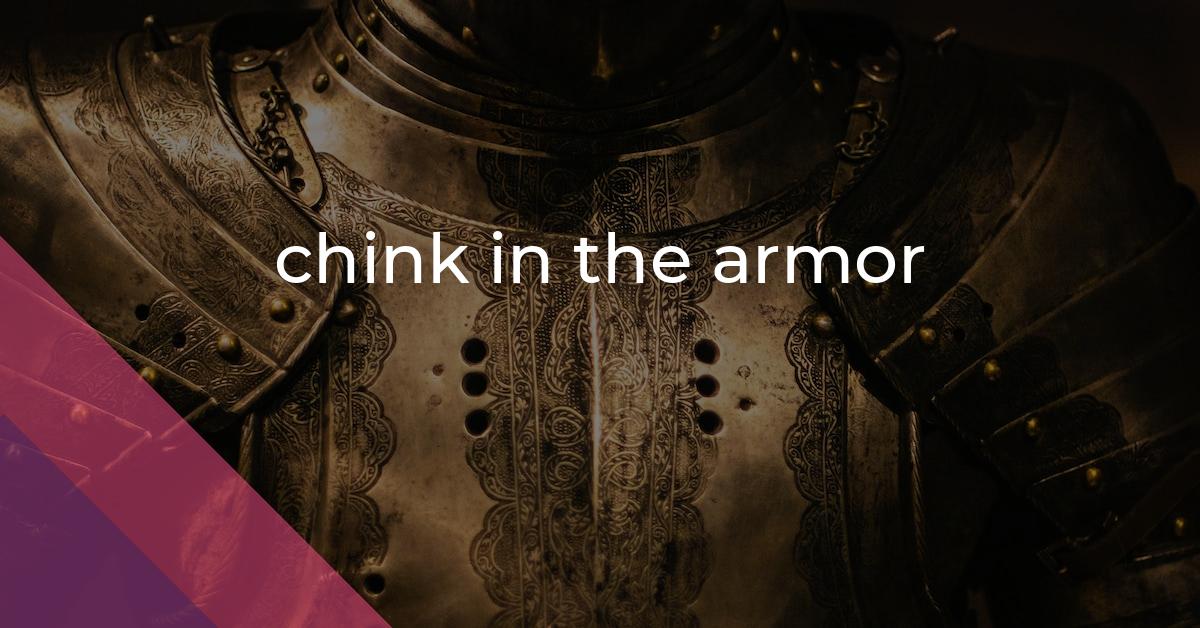chink in the armor: Idiom Meaning and Origin
What does ‘chink in the armor’ mean?
The idiom "chink in the armor" refers to a vulnerability or weakness in someone or something that was previously thought to be strong or invulnerable.

Idiom Explorer
The idiom "lead with one's chin" means to put oneself at risk or in a vulnerable position by being outspoken or provocative.
The idiom "knight in shining armor" refers to a person who comes to someone's rescue, providing help and support in a difficult situation. The phrase evokes the image of a chivalrous knight, symbolizing a heroic and selfless individual.
The idiom "in the crosshairs" means to be the target of attention, criticism, or potential harm.
The idiom "hit someone when they are down" means to take advantage of or attack someone when they are already in a vulnerable or weakened state.
The idiom "hide in plain sight" means to conceal oneself or something in a way that is not obvious or easily noticed, even though it is in a highly visible or noticeable place.
The idiom "heart of glass" is used to describe someone who is emotionally fragile or sensitive, often referring to someone who is easily hurt or vulnerable.
The idiom "hard nut to crack" refers to a person or problem that is difficult to understand, solve, or deal with. It implies that the person or problem is challenging and requires a great deal of effort and perseverance to overcome or solve.
The idiom "glass chin" is used to describe someone who is easily hurt, either physically or emotionally, and cannot handle criticism or difficult situations well.
The idiom "fox in the henhouse" refers to a person or thing that poses a threat or danger by infiltrating a group or situation where they are not welcome or trusted.
The idiom "fly in the ointment" refers to a small but significant flaw or issue that spoils something positive or favorable. It symbolizes how even a small problem can greatly detract from the overall enjoyment or success of a situation.
Decoding Vulnerability
The idiom "chink up" is a related expression that can be used in conjunction with "chink in the armor." Similar to "chink in the armor," "chink up" refers to identifying and addressing weaknesses or vulnerabilities. It suggests taking action to fortify or strengthen a person or system that may have a potential weak point. While "chink in the armor" focuses on identifying the weakness, "chink up" emphasizes the subsequent steps taken to address and rectify it. Together, these two idioms provide a comprehensive view of acknowledging weaknesses and taking proactive measures to overcome them.
Another related idiom is "glass chin." This phrase is commonly used in the context of boxing or other combat sports to describe a participant who is particularly susceptible to being knocked out with a single punch. A "glass chin" refers to a weak jaw or the ease with which an opponent can exploit a vulnerability. When applied metaphorically, "glass chin" can be used to describe someone who is emotionally or mentally fragile, similar to a person with a chink in their armor. Both of these idioms highlight the vulnerability and weaknesses that individuals may possess, whether it be physical or emotional.
Lastly, the idiom "knight in shining armor" provides a contrasting perspective to the phrase "chink in the armor." While "chink in the armor" focuses on vulnerabilities and weaknesses, "knight in shining armor" emphasizes strength and protection. This idiom is often used to describe someone who comes to the rescue or saves the day in a difficult situation. It signifies a person who is trustworthy, reliable, and capable of providing assistance. Unlike the notion of a "chink in the armor," a "knight in shining armor" is an individual who is seen as noble and invincible, with no apparent flaws.
Example usage
1. Despite being a top-notch defense player, his one weakness was a chink in the armor, which was his inability to defend against high kicks.
2. The company's stellar reputation suffered a major blow when a scandal exposed a chink in its armor, revealing a lack of proper financial oversight.
3. After months of rigorous training, the athlete was ready to compete, but a persistent shoulder injury proved to be a chink in his armor, hindering his performance.
More "Weakness" idioms



